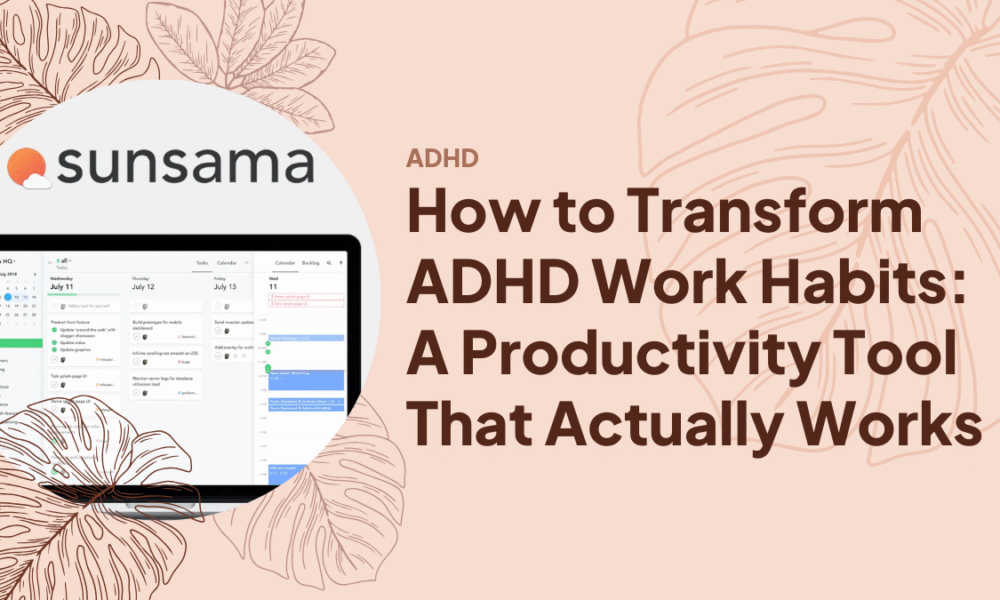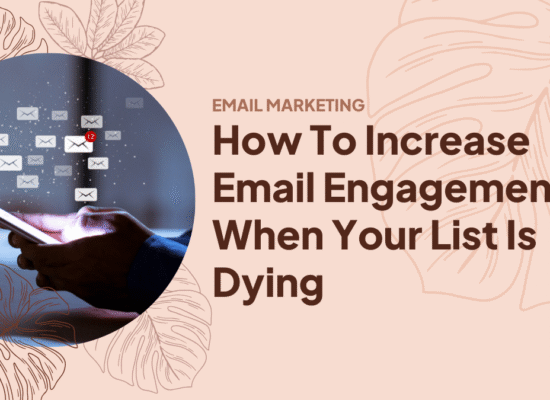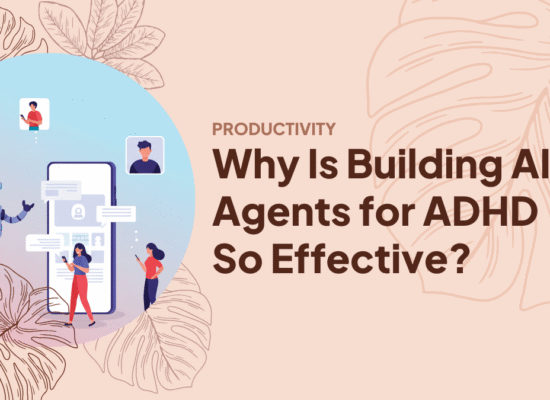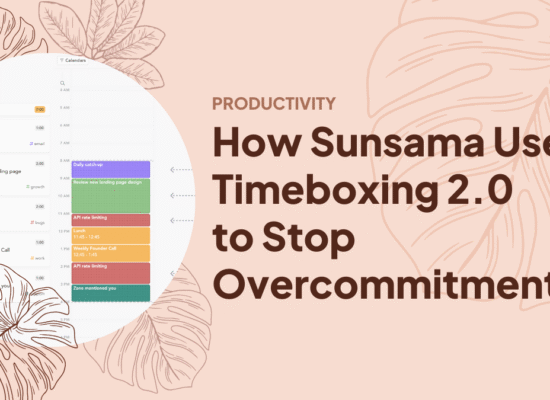Table of Contents
- Why Traditional Productivity Methods Fail ADHD Work Habits
- When the Right Tool Meets ADHD Work Habits
- The Business Case for Supporting ADHD Work Habits
- What Makes the Difference in Transforming ADHD Work Habits
- How to Support ADHD Work Habits
- The Broader Market Opportunity
- Measuring Real Impact on ADHD Work Habits
- Looking Forward
- Experience How Sunsama Can Change Your Productivity
Twenty-two days of lost productivity per year. That’s the reality for adults trying to manage ADHD work habits in traditional workplace environments, according to the World Health Organization. When you multiply this across the workforce, we’re looking at $138 billion in lost income and productivity annually in the U.S. alone.
For growing businesses, this represents a massive hidden cost that most leaders never see coming. But here’s what caught my attention as someone who works with mid-sized companies on digital optimization: one productivity tool has been quietly transforming ADHD work habits, and the results are measurable.
Why Traditional Productivity Methods Fail ADHD Work Habits
Most productivity solutions fail to address ADHD work habits because they’re built for neurotypical brains. The standard advice about time blocking and rigid task management often creates more friction than flow for people with ADHD.
The workplace impact extends beyond individual productivity. When talented employees struggle with executive function challenges that affect their ADHD work habits, entire teams feel the ripple effects. Projects stall, communication breaks down, and burnout accelerates.
Traditional productivity tools compound these problems by adding complexity rather than reducing cognitive load. They demand rigid structures that clash with how ADHD brains naturally process information and manage energy.
When the Right Tool Meets ADHD Work Habits
Sunsama approached productivity differently, specifically designing features that work with ADHD work habits rather than against them. Instead of forcing users into predetermined workflows, they built flexibility into their core design.
One user shared: “I have ADHD and I’ve been overjoyed with the way Sunsama helps me reduce the pain points I experience with executive function at work.”
This feedback represents something significant. When productivity tools actually support ADHD work habits, the impact extends far beyond individual task completion. The platform incorporates ADHD-friendly strategies like task breakdown, visual progress tracking, and “done for the day” boundaries—making Sunsama for ADHD brains a practical solution.
These features address specific executive function challenges that traditional tools ignore, directly supporting healthier ADHD work habits.

The Business Case for Supporting ADHD Work Habits
Companies that embrace solutions for managing ADHD in the workplace see measurable returns. Sunsama’s own growth demonstrates this market demand clearly—they scaled from zero to six-figure ARR in just two months, increased conversion rates by 3x, and decreased customer acquisition costs by 56%.
The business implications extend beyond productivity metrics. When employees have tools that actually work with their ADHD work habits rather than against them, engagement increases, turnover decreases, and innovation flourishes.
Smart companies recognize that neurodivergent professionals often bring unique strengths to their teams. The key is providing the right support systems to unlock that potential through proper ADHD workplace accommodations.
What Makes the Difference in Transforming ADHD Work Habits
Effective productivity tools for improving ADHD work habits share specific characteristics that separate them from generic solutions. They prioritize visual feedback, flexible scheduling, and cognitive load reduction.
Sunsama’s approach centers on daily planning rituals that prevent overwhelm while supporting sustainable ADHD work habits. Users can see their capacity, adjust expectations in real-time, and celebrate completion rather than focusing on endless to-do lists.
The “done for the day” feature particularly resonates with users developing better ADHD work habits. It provides clear boundaries that help prevent the hyperfocus-burnout cycle that derails many neurodivergent professionals.
These design choices reflect deeper understanding of how executive function works. Instead of fighting against ADHD traits, the tool leverages them as strengths to build consistent, healthy work habits.

How to Support ADHD Work Habits
Companies considering ADHD workplace accommodations should focus on flexibility over rigid structure. The most successful implementations allow individual customization while maintaining team coordination.
Start with pilot programs that let employees choose their preferred tools for managing ADHD in the workplace. This approach reveals which solutions actually improve ADHD work habits versus those that simply look good in theory.
Measure success through output quality and employee satisfaction, not just task completion rates. Professionals developing better ADHD work habits often work in different rhythms that produce superior results when properly supported.
Training managers to recognize and accommodate different working styles amplifies the impact of any productivity tool designed to support ADHD work habits.
The Broader Market Opportunity
The success of tools supporting ADHD work habits reveals a larger trend in workplace accommodation. As companies compete for talent, neurodivergent-friendly policies become competitive advantages.
Remote work has already shifted expectations about flexibility and autonomy. Productivity tools that support diverse ADHD work habits represent the next evolution in this trend.
The market opportunity extends beyond ADHD specifically. Many productivity challenges that affect ADHD work habits also impact neurotypical employees during high-stress periods or major life transitions.
Companies that invest in inclusive productivity solutions often discover they’ve improved the experience for their entire workforce, not just those working to develop better ADHD work habits.

Measuring Real Impact on ADHD Work Habits
The true test of any productivity solution lies in sustained usage and measurable improvements in ADHD work habits. Sunsama’s growth trajectory suggests they’ve achieved both.
User testimonials consistently highlight reduced stress, improved work-life boundaries, and better project completion rates. These qualitative improvements in ADHD work habits translate into quantifiable business benefits.
The platform’s ambassador program, built organically through user sharing, demonstrates genuine satisfaction. People don’t voluntarily promote tools that don’t deliver meaningful improvements to their ADHD work habits.
For businesses evaluating productivity solutions, look for evidence of sustained engagement rather than initial adoption rates. The best tools become invisible parts of daily workflow rather than additional tasks to manage.
Looking Forward
The intersection of neurodivergent needs and productivity technology represents an emerging market with significant potential. As awareness grows, expect more specialized solutions targeting ADHD work habits and other cognitive styles.
Companies that embrace this trend early will have advantages in talent acquisition and retention. Neurodivergent professionals often bring creativity, hyperfocus abilities, and unique problem-solving approaches that drive innovation.
The key lies in recognizing that developing effective ADHD work habits isn’t one-size-fits-all. Tools that accommodate different cognitive styles don’t just help individuals—they strengthen entire organizations.
The $138 billion productivity loss from ADHD represents opportunity, not just cost. Companies that provide the right support systems can capture significant value while creating more inclusive workplaces and helping employees develop sustainable ADHD work habits.
Key Takeaways
- ADHD work habits require specialized productivity tools that work with executive function challenges, not against them.
- Companies implementing ADHD workplace accommodations see measurable improvements in engagement, retention, and innovation.
- Tools like Sunsama demonstrate that flexible, visual productivity systems can transform ADHD work habits effectively.
Experience How Sunsama Can Change Your Productivity
Frequently Asked Questions
What are the most effective strategies for improving ADHD work habits?
Focus on visual planning tools, flexible scheduling, and clear daily boundaries that prevent overwhelm while building sustainable routines.
How can employers support employees with ADHD work habits?
Provide flexible productivity tools, train managers on neurodivergent needs, and measure success through output quality rather than rigid adherence to traditional workflows.
What makes Sunsama effective for ADHD work habits?
Sunsama’s visual interface, daily planning rituals, and “done for the day” boundaries specifically address executive function challenges common in ADHD.
Maria is an accomplished digital marketing professional, specializing in content marketing and SEO. She's a neurodivergent who strives to raise awareness, and overcome the stigma that envelopes around mental health.






